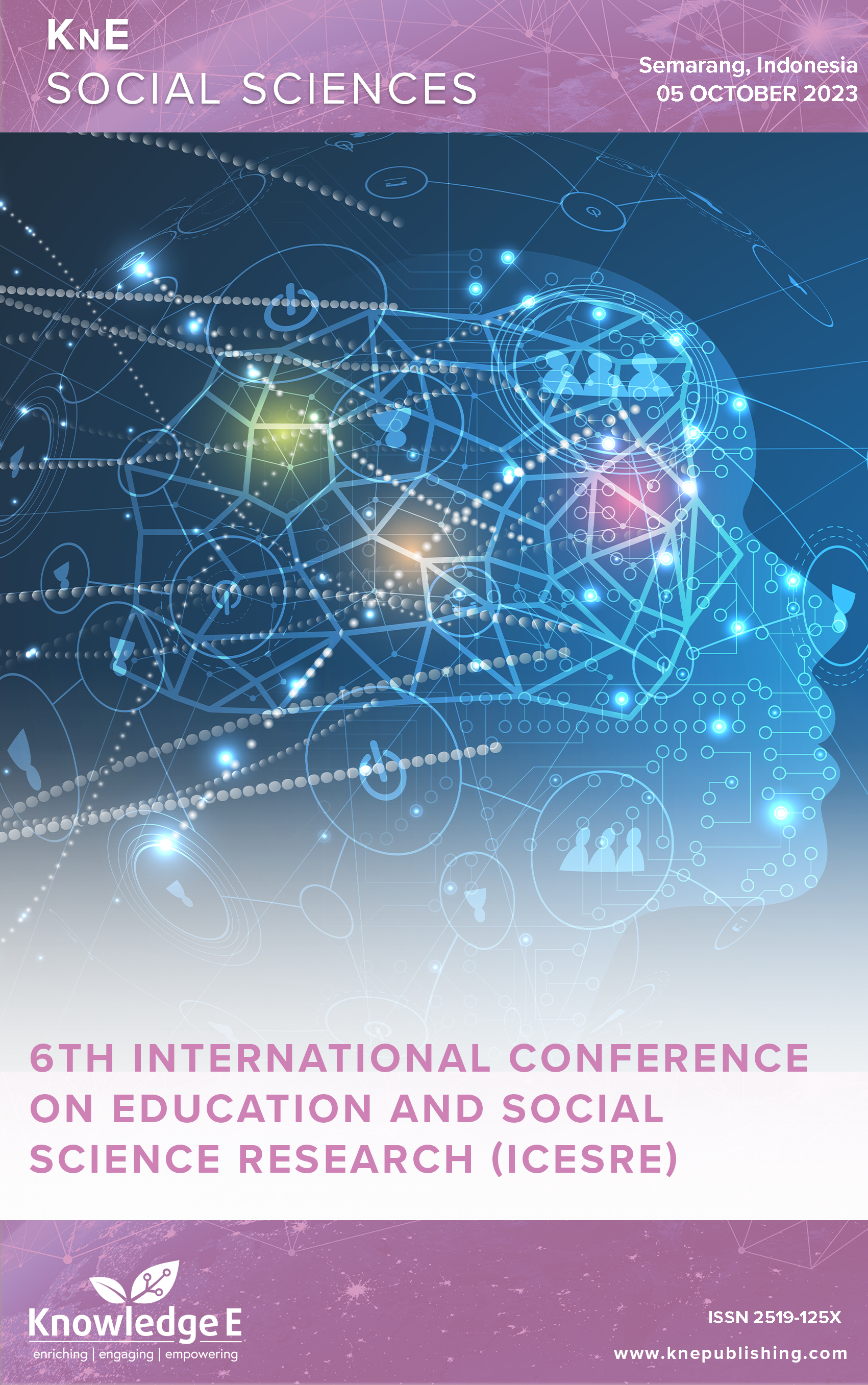Communication of Dayak Ngaju's Language in the Form of Local Families in Central Borneo, Indonesia
DOI:
https://doi.org/10.18502/kss.v9i6.15294Abstract
This research will focus on the use of Dayak Ngaju communication related to the form of family greetings that can be seen from the completeness of its elements. Dayak Ngaju communication forms of family greetings are divided into three parts namely: complete greeting forms, incomplete greeting forms, and a combination of complete greeting forms and incomplete greeting forms. Based on the meaning and meaning of language communication, the form of family greetings includes the form of self-names, kinship terms, national titles, adjective transpositions, and beatings. The most influential factors of communication in the form of family greetings are: first, the seniority factor in terms of age, seniority is commonly known globally. The senior will hold the most influential string of honor. However, seniority in this tribe is related to the age of the oldest from the older people. So the oldest age position will hold the highest rope and receive the highest familial honor. As a reflection it is appropriate to be a leader in the family ties within the internal environment of their family, second is the level of rank in the family such as birth order. Based on this birth order, generally, families in this tribe will give honorary titles based on birth order. If the first sibling or first brother is not present then the authority to manage the family will be delegated to the sibling born in the second order.
Keywords: communication, Dayak Ngaju, greeting form, polite language
References
Manera AB, Vecaldo RT, Saquing JB. Cultural structuring of Urok practice: an intercultural communication of the Bago tribe in Kalinga province, Philippines. Int J Psychosoc Rehabil. 2020;24(06).
Felber T. Kiat Praktis Komunikasi dalam Kehidupan Keluarga dan Profesional. Jakarta: Gramedia; 2007.
Sanawiah S, Abdalla MR. Hukum Keikutsertaan Warga Dayak Ngaju Muslim Dalam Pelaksanaan Upacara Tiwah. Jurnal Hadratul Madaniyah. 2018 Dec;5(2):1–2. DOI: https://doi.org/10.33084/jhm.v5i2.883
Darmawan KZ. Penelitian etnografi komunikasi: tipe dan metode [ Jurnal Komunikasi]. MediaTor. 2008 Jun;9(1):181–8. DOI: https://doi.org/10.29313/mediator.v9i1.1142
Lockshin J, Williams T. “We need to start thinking ahead”: the impact of social context on linguistic norm adherence. InAnnual meeting of the cognitive science society 2020 Jan. DOI: https://doi.org/10.31234/osf.io/2wtzq
Radfar B, Shivaram K, Culotta A. Characterizing variation in toxic language by social context. InProceedings of the international AAAI conference on web and social media 2020 May 26 (Vol. 14, pp. 959-963). https://doi.org/10.1609/icwsm.v14i1.7366. DOI: https://doi.org/10.1609/icwsm.v14i1.7366
Harapan E, Ahmad S, MM D. Komunikasi antarpribadi: Perilaku insani dalam organisasi pendidikan. PT. RajaGrafindo Persada-Rajawali Pers; 2022 Jul 7.
Tania AS, Nurudin N. Self Disclosure Komunikasi Antar Pribadi Pasangan Jarak Jauh Dalam Mempertahankan Hubungan Saat Physical Distancing Era Pandemic COVID- 19. Komuniti: Jurnal Komunikasi dan Teknologi Informasi. 2021 Jul 14;13(1):1-5. DOI: https://doi.org/10.23917/komuniti.v13i1.12935
Tondo H. Kepunahan bahasa-bahasa daerah: Faktor penyebab dan implikasi etnolinguistis. Jurnal masyarakat dan budaya. 2009;11(2):277-96.
Apandie C, Ar ED. Huma Betang: Identitas Moral Kultural Suku Dayak Ngaju Kalimantan Tengah. Journal of Moral and Civic Education. 2019 Nov;3(2):76–91. DOI: https://doi.org/10.24036/8851412322019185
Suswandari S, Armiyati L, Azid N. Local wisdom of dayak ethnic groups in central kalimantan, Indonesia. ETNOSIA: Jurnal Etnografi Indonesia. 2022 Jun;7(1):67–85. DOI: https://doi.org/10.31947/etnosia.v7i1.20633
Sinaga J, Sinambela JL, Widyatiningtyas R. Social Solidarity: Getting to Know the Uniqueness and Cultural Appeal of Traditional Dayak Tribes. East Asian Journal of Multidisciplinary Research. 2023 Apr;2(4):1661–74. DOI: https://doi.org/10.55927/eajmr.v2i4.3767
Wurdianto K, Norsandi D, Fitriana E. Etnopedagogi Batang Garing Suku Dayak Ngaju sebagai Nilai Pendidikan Karakter Peduli Lingkungan. Scaffolding: Jurnal Pendidikan Islam dan Multikulturalisme. 2022 Nov 5;4(3):45-64. DOI: https://doi.org/10.37680/scaffolding.v4i3.1936
Kristianus K. The effect of Catholic religion on Dayak identity in West Kalimantan. International Journal of Multi Discipline Science. 2022 Feb;5(1):1–9. DOI: https://doi.org/10.26737/ij-mds.v5i1.3124
Hendra A, Marseda IA. Eco-Etika Dalam Budaya Manugal Dayak Ngaju (Tinjauan Ekologis Berdasarkan Ensiklik Laudato Si Art. 139). ENGGANG: Jurnal Pendidikan, Bahasa, Sastra, Seni, dan Budaya. 2022 Jun 20;2(2):146-54. DOI: https://doi.org/10.37304/enggang.v3i1.4938
Bella R, Gujali AI, Dewi RS, Lion E, Maryam M. Sistem Masyarakat dan Organisasi Suku Dayak Ngaju (Studi Kasus di Desa Mandomai Kalimantan Tengah). Jurnal Kewarganegaraan. 2021 Dec;5(2):364–75. DOI: https://doi.org/10.31316/jk.v5i2.1676
Dlaifurrahman M, Aseri AF, Mujiburohman M. Hukum Hadat Dayak Ngaju: Tahiu Janji Pangawin di Kalimantan Tengah. Al Qalam: Jurnal Ilmiah Keagamaan dan Kemasyarakatan. 2023 Jan 30;17(1):414-32. DOI: https://doi.org/10.35931/aq.v17i1.1576
Citranu C. Hermeneutika Belom Bahadat Sebagai Wujud Kesadaran Hukum Masyarakat Adat Dayak Di Wilayah Kedamangan Kecamatan Selat Kabupaten Kapuas. Jurnal Hukum Agama Hindu Widya Kerta. 2022 Nov;5(2):117–37.

